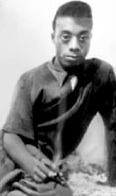
James Baldwin
photograph courtesy
of Claire Burch
Selected works by
James Baldwin
GO TELL IT ON THE
MOUNTAIN, 1953
NOTES OF A
NATIVE SON, 1955
GIOVANNI’S ROOM, 1956
NOBODY KNOWS
MY NAME, 1962
ANOTHER COUNTRY, 1962
THE FIRE NEXT TIME, 1963
NOTHING PERSONAL (with
Richard Avedon), 1964
BLUES FOR MISTER
CHARLIE (a play), 1964
GOING TO MEET
THE MAN, 1965
TELL ME HOW LONG THE
TRAIN’S BEEN GONE, 1968
THE AMEN CORNER
(a play), 1968
A RAP ON RACE (with
Margaret Mead), 1971
NO NAME IN THE
STREET, 1972
A DIALOGUE
(with Nikki Giovanni), 1973
ONE DAY, WHEN
I WAS LOST, 1973
IF BEALE STREET
COULD TALK, 1974
THE DEVIL FINDS
WORK, 1976
LITTLE MAN, LITTLE MAN:
A STORY OF CHILDHOOD
(with Yoran Cazac), 1976
JUST ABOVE
MY HEAD, 1979
THE EVIDENCE OF THINGS
NOT SEEN, 1985
PERSPECTIVES; ANGLES
ON AFRICAN ART, 1987



















